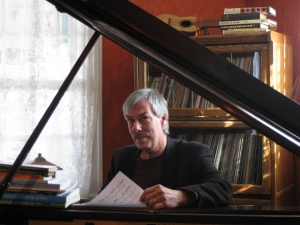
Lucky me: I grew up in a musical family. Music was my primary language. Ask my English teachers.
My grandmother Lucy would sit at the spinet and barrel through Chopin Ballades with her rheumatoid gnarled tangle of fingers while ashes fell on the keys from the Luckys she chain-smoked. I’d sidle up, enthralled.
As a young man, my dad sang professionally. To unwind in the evenings, he’d pour himself a jigger or three of Old Grand-Dad and sing Italian songs, American songbook standards, and folk tunes, accompanying himself at that same spinet, singing along with my brother Bill. Or he'd throw a stack of 78s of classical music onto the Garrard.
“Can I take piano lessons?” I asked my parents. “Not till you learn the alphabet.”
So after a little See Dick see Dick run, it’s off to Teaching Little Fingers to Play. Ticking timers notwithstanding, my little fingers never learned that well. My dad asked a musician buddy about my prospects. “I think, someday, he may become a great… music critic!”
But I did pick up some tricks along the way. Positioning me blindfolded and back turned, my dad would seat his buddies down at the piano. “Go ahead. Play a note. Any note.” Clang. “F sharp,” I’d reply. My dad would grin; the friend would gawk. Perfect pitch. (What’s the big deal?)
When I was 10, Josie Carey, host of the local (Pittsburgh) WQED show Children’s Hour, came on and said, “Kiddies: send us your compositions. We’ll play ‘em on the air.” I took a sheet of lined paper; filled in staff lines, clefs, notes, and rests; whipped out a 16-bar Haydnesque mini-minuet; affixed a three-cent stamp, and sent it in. And my Opus 1 was played on the air! By the behind-the-scenes puppeteer, who happened also to be able to play piano. Later that puppet master emerged from behind the curtains — still as the local kids show guy — Mr Rogers.
In 1956 — I was still 10 — my parent traveled to Peru and brought back a trove of Andean records (Florencio Coronado, Fresia Saavedra, unpolished Yma Sumac) to add to my doo-wop and rock collection (Crows, Chuck Berry, Bo Diddley — on 78s!); and a quena to go along with my Armstrong flute.
When I was 13, I plunged full tilt into twentieth-century orchestral music — Hindemith, Shostakovich, and all the others — voraciously buying records, recording broadcasts onto my Wollensack, and studying and transcribing scores from Carnegie Library.
At 16, I went to Córdoba, Argentina, as a summer exchange student. I was already familiar with zambas and chacareras, so when I got there, I jubilantly immersed myself in the culture and music, attending folklore demos and going to tango parties. I returned to the States longing to play folk music myself. I shelled out $35 for guitar at Petty's Music, and Vicki Homer — and later Carver Blanchard — graciously taught me how play it.
Still in my teen years, I’d synthesized my unified theory of music: It was all one. Miles, Mahler, Les Baxter, Bernard Herrmann, Buddy Holly, Eduardo Falú, Mariano Mores, Odetta, Hank Williams, Stockhausen, the Flamingos — all one. And I wanted to bring it all together, write movie music.
I went on to study composition at Chicago Musical College at Roosevelt University with Robert Lombardo and Ramon Zupko. Dr Lombardo connected me with a producer at WSNS-TV, who used a composition of mine as a theme to a creepy late-night show. First paid commission.
I also worked with Ray Wilding-White of DePaul University as a composer and performer in his seminal multimedia performance arts troupe, the Loop Group.
Fast forward: toward a Masters degree, I studied orchestration with Roger Hannay at UNC Chapel Hill.
Since 1990, I’ve been the composer, sound designer, musical director, or some combo, for 75 productions; and have composed some 400 commissioned pieces.